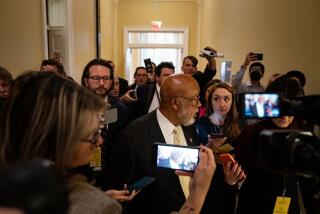E-Voting: 1 County Sues State
Riverside County’s Board of Supervisors voted Tuesday to sue the state’s top election official to regain the right to use electronic voting machines in November.
Officials in five other counties said they also might seek court approval to use their touch-screen voting machines on election day, which would overturn the temporary ban on their use and keep California on an aggressive path from paper to electronic balloting.
Secretary of State Kevin Shelley, noting security and technological concerns about the machines, banned electronic voting in four counties whose machines used unapproved software. He also decertified and set strict conditions for recertifying 10 other counties, including Riverside, that intended to use the machines in November.
Riverside County, which began using touch-screen machines in 2000, has been at the forefront of counties adopting electronic voting systems. The movement gained momentum nationwide when Florida’s punch-card ballot problems brought the 2000 presidential election to a historic standstill.
Supervisors and the elections chief in Riverside County said Shelley’s ban angered them, especially because the county had used its Sequoia Voting Systems machines for 29 elections without any significant problems.
“Clearly, in California, we don’t want to regress back to the more flawed systems based upon paper,” said Riverside County Registrar of Voters Mischelle Townsend.
Officials in Orange and Santa Clara counties said they hoped to still use electronic voting in November by meeting Shelley’s conditions.
A Shelley spokesman said Tuesday that the secretary acted appropriately and in the best interests of California voters when he barred the four counties from using their touch-screen devices for the November election and told the other 10 counties using other devices to meet 23 conditions.
Among Shelley’s conditions is that county election officials print and record a copy of every ballot cast electronically so they can be audited or recounted, and that voters be given the option of voting on paper ballots.
“The secretary acted within his authority, and his actions are consistent with state and federal law,” said the spokesman, Doug Stone. “He understands the challenges faced by local officials. We will work closely with them to replace the decertified machines or to implement the security measures for recertification. His goal is to make sure that every vote cast in November is cast with confidence and that the system to be used is secure.”
Riverside County Counsel William Katzenstein said he expected the lawsuit to be filed Thursday. He said the suit would focus in part on the benefit that he says touch-screen voting provides to disabled and visually impaired voters who can use the machines without assistance.
Election officials in Kern and Napa counties said they were considering joining the lawsuit, and officials in San Bernardino, Plumas and Shasta counties said they were also considering legal action. California counties have spent more than $100 million on electronic voting systems that are now ineligible under Shelley’s order.
“We will certainly do everything we can to support our sister counties in this effort,” said Napa County Registrar of Voters John Tuteur. He said Shelley had called him Tuesday and offered to meet soon to try to resolve the counties’ concerns about getting their machines improved in time for November. “If we can’t reach some accommodation with Secretary Shelley in the very near future, then the only alternative is to ask for judicial intervention. We can’t go very long without resolving the dispute.”
Steve Weir, Contra Costa County’s registrar of voters and treasurer of the California Assn. of Clerks and Election Officials, said it was not surprising that counties were considering litigation because of their major investment in the technology. Many of them will have a difficult time meeting Shelley’s demands to use the machines in time for November, he said.
“A presidential election is not the time to be monkeying with this,” he said.
Los Angeles County, which sets up touch-screen voting machines in public places for the weeks before each election, is also affected by the decision.
The county has not decided how to respond to Shelley’s directive. That’s in part because it is focusing on a lawsuit, filed by advocates for disabled voters, that would require the county to install touch-screen machines at every polling place in the county, said Kristin Heffron, the county chief deputy registrar.
“It makes it difficult, to say the least, to know which way to jump,” Heffron said.
In Orange County, the Board of Supervisors said it was not ready to sue over Shelley’s orders. Instead, the board and Registrar Steve Rodermund hope to decide June 1 whether the county will be able to meet Shelley’s demands so it can use its electronic voting machines in November, or whether uncertainty will force it to use paper ballots instead.
“We just want to make sure we do it right. What we don’t want to do is compress ourselves so we’re in a crisis mode,” Rodermund said.
He said it could cost the county as much as $1.6 million more to conduct an election with paper ballots in November.
Stone, Shelley’s spokesman, said state election officials would work closely with county officials to help them meet the requirements for using their electronic voting systems in November.
Stone said he expected Orange County to know by June 1 whether its machines would be approved.
“May will be a pivotal month in this process. We’re working toward getting information to the affected counties that spells out in more detail what they will need to do, with timelines, to be recertified,” Stone said. “It should provide Orange County with enough time to meet that June 1 deadline.”
More to Read
Get the L.A. Times Politics newsletter
Deeply reported insights into legislation, politics and policy from Sacramento, Washington and beyond. In your inbox three times per week.
You may occasionally receive promotional content from the Los Angeles Times.








